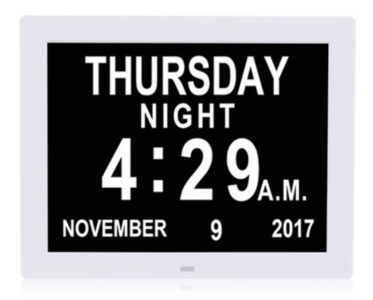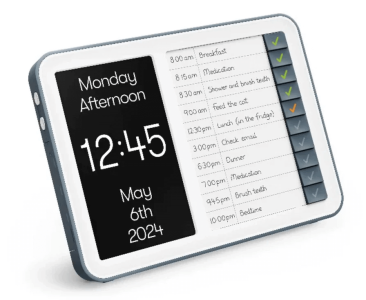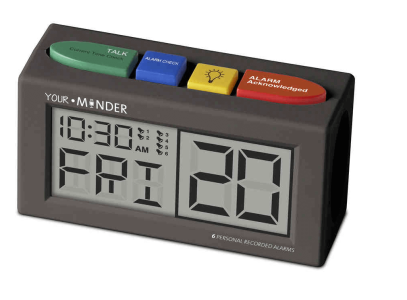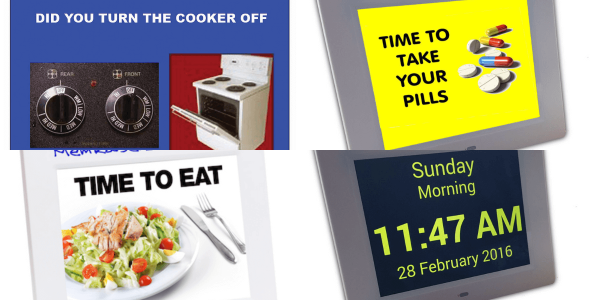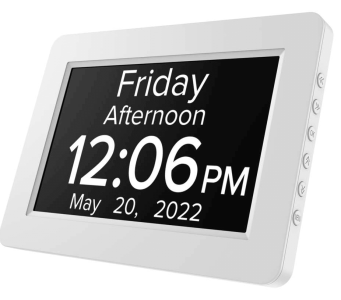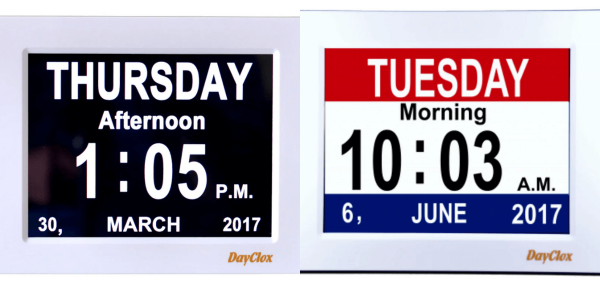Tech Talk with Dr Al: Alzheimer’s Clocks
- Replies 5
Note from the Editor:
This article was kindly written for the SDC by member @Doctor Alan.
Unfortunately, Dementia and Alzheimer’s disease affects a lot of us as we get older, but there is a great deal of help out there and a number of ways in which we can benefit from simple technology. Just knowing the day, date, and time – with a morning, afternoon, or evening notification – is very helpful.
Features:
Day, Date and Time: It is very useful to know what part of the day it is, such as morning, afternoon or evening.
12-inch Digital Calendar Day Clock Orientation-Clock DC1201 from TabTimer $199.
Medication schedule: The more sophisticated clocks can additionally include a schedule for your daily routines, such as when to take medication and so on. The clock shown has a customisable face and can be paired with other clocks with a system called ‘Day Connect’ (up to three additional displays) to make sure reminders are heard throughout the house. This does not need WiFi or, in fact, any internet connection to function and the time shown will adjust automatically for daylight saving.
'Day Hub' dementia clock from Dementia Shop $399.
Recordable Memos: Some Alzheimer’s clocks include a facility for recording memos or reminders throughout the day.
YourMinder 3000x2000 from TabTimer $109.
Audio-Visual verbal prompts: A very useful feature that gives reminders of medication schedules, meal times, personal care times, appointments or other important highlights of the day. The particular clock shown here stores many audio-visual prompts, and I have only listed a few:
MemRabel-2 from TabTimer $349.
There are other clocks that are not quite as comprehensive as that shown but nevertheless give audio messages:
8" TALKING Digital Dementia Orientation Day Clock from TabTimer $189.
Coloured Displays: It is possible on some clocks of this nature to be able to change the colour of the display to highlight the day or time of day etc.
DayClox from Dementia Shop $165.
Some clocks may be wall-hanging or desktop. This allows the clock or clocks to be placed strategically in several rooms. The anxiety of knowing what time of day it is and whether medication needs to be taken is therefore removed for people living with early Alzheimer’s.
For those suffering memory loss and dementia, there is a great deal of comfort derived from structure, routine and predictability. The importance of security in knowing the time of day, the day of the week or even whether it is day or night cannot be overemphasised.
I have endeavoured to research a number of clocks that would appear to have the potential to ease the mental suffering of dementia patients. The prices shown may be reduced by a little research when the time comes to consider buying such a device.
About the author: Having spent three years living in Australia in his youth, Alan returned to Australia in 1969 with his wife and young child. Holding a Bachelor of Engineering degree and a Doctor of Science Education degree, Alan has experience in flight simulations, Einsteinian physics, and inventing an ‘eye blink’ device that allows cerebral palsy patients to communicate. He even took a turn at acting, starring in a TV advert and landing supporting and lead roles in his local dramatic society plays. His short stories have been published in WA’s The Gingin Buzz for ten years, and his novel The Magic Hourglass is a work in progress. He and his wife have a lovely life in Brisbane and regularly visit their two children in Sydney’s West. You can read Alan’s full-length bio here.
From the Editor:
Is this something you’d buy or use? I feel like as each year passes my memory really does struggle a little more. I even write the day on my medication packets, so I remember if I’ve taken them. Maybe I need one of these!
Love Alan’s writing and want to read more? You might also like to read:
This article was kindly written for the SDC by member @Doctor Alan.
Unfortunately, Dementia and Alzheimer’s disease affects a lot of us as we get older, but there is a great deal of help out there and a number of ways in which we can benefit from simple technology. Just knowing the day, date, and time – with a morning, afternoon, or evening notification – is very helpful.
Features:
Day, Date and Time: It is very useful to know what part of the day it is, such as morning, afternoon or evening.
12-inch Digital Calendar Day Clock Orientation-Clock DC1201 from TabTimer $199.
Medication schedule: The more sophisticated clocks can additionally include a schedule for your daily routines, such as when to take medication and so on. The clock shown has a customisable face and can be paired with other clocks with a system called ‘Day Connect’ (up to three additional displays) to make sure reminders are heard throughout the house. This does not need WiFi or, in fact, any internet connection to function and the time shown will adjust automatically for daylight saving.
'Day Hub' dementia clock from Dementia Shop $399.
Recordable Memos: Some Alzheimer’s clocks include a facility for recording memos or reminders throughout the day.
YourMinder 3000x2000 from TabTimer $109.
Audio-Visual verbal prompts: A very useful feature that gives reminders of medication schedules, meal times, personal care times, appointments or other important highlights of the day. The particular clock shown here stores many audio-visual prompts, and I have only listed a few:
MemRabel-2 from TabTimer $349.
There are other clocks that are not quite as comprehensive as that shown but nevertheless give audio messages:
8" TALKING Digital Dementia Orientation Day Clock from TabTimer $189.
Coloured Displays: It is possible on some clocks of this nature to be able to change the colour of the display to highlight the day or time of day etc.
DayClox from Dementia Shop $165.
Some clocks may be wall-hanging or desktop. This allows the clock or clocks to be placed strategically in several rooms. The anxiety of knowing what time of day it is and whether medication needs to be taken is therefore removed for people living with early Alzheimer’s.
For those suffering memory loss and dementia, there is a great deal of comfort derived from structure, routine and predictability. The importance of security in knowing the time of day, the day of the week or even whether it is day or night cannot be overemphasised.
I have endeavoured to research a number of clocks that would appear to have the potential to ease the mental suffering of dementia patients. The prices shown may be reduced by a little research when the time comes to consider buying such a device.
About the author: Having spent three years living in Australia in his youth, Alan returned to Australia in 1969 with his wife and young child. Holding a Bachelor of Engineering degree and a Doctor of Science Education degree, Alan has experience in flight simulations, Einsteinian physics, and inventing an ‘eye blink’ device that allows cerebral palsy patients to communicate. He even took a turn at acting, starring in a TV advert and landing supporting and lead roles in his local dramatic society plays. His short stories have been published in WA’s The Gingin Buzz for ten years, and his novel The Magic Hourglass is a work in progress. He and his wife have a lovely life in Brisbane and regularly visit their two children in Sydney’s West. You can read Alan’s full-length bio here.
From the Editor:
Is this something you’d buy or use? I feel like as each year passes my memory really does struggle a little more. I even write the day on my medication packets, so I remember if I’ve taken them. Maybe I need one of these!
Love Alan’s writing and want to read more? You might also like to read:
- Robot Vacuum Cleaners – The Ideal Maid!
- Mobility Scooters – No Hoons Here!
- Mobiles Phones for Seniors
- Time For A Hobby - Clocks
Last edited:

